Best of the Booker: which book should win?
Jim Crace’s Harvest is the bookmaker’s favourite to win the 2013 Man Booker prize – and we will find out who gets the £50,000 prize on Tuesday. But which book gets the Channel 4 News seal of approval?
A Tale For The Time Being, Ruth Ozeki 5 / 5
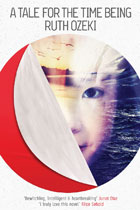 I judged a book by its cover when I was handed this novel – and I regret it. The cover is uninspiring, the blurb is tame and saccharine, and I almost put it back.
I judged a book by its cover when I was handed this novel – and I regret it. The cover is uninspiring, the blurb is tame and saccharine, and I almost put it back.
But the novel inside is fantastic. Moving, challenging, and evocative, it creates a whole world around the reader and then gently taps the side of it, so the world begins to waver and dissolve in front of their very eyes.
The story follows a young Japanese girl whose diary washes up on a remote beach in Canada, and the woman who finds it. It made me want to go to Japan, meditate, and find out much, much more about quantum physics (the end in particular is a bit mind-bending if you’ve had a long day). Not bad going.
by Jennifer Rigby
Harvest, Jim Crace
3.5 / 5
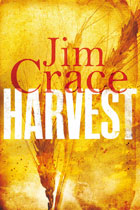
Jim Crace’s Harvest is set in an English village in what appears to be the 17th century. Working life, based around the field and the plough, is suddenly threatened by a new lord of the manor who has plans to enclose the common land and turn it into pasture.
Meanwhile, an unexplained fire in the manor stable coincides with the arrival of three strangers, two men and a young woman who arouses the passions of several of the locals. The story, covering a mere seven days, unfolds through the eyes of villager Walter Thirsk.
Crace’s language is rich, atmospheric and evocative. As events move inexorably towards their grim conclusion, this account of the destruction of an ancient rural community acquires contemporary and even biblical resonance.Definitely a contender.
By Mark Greaves
Alternative Booker: Channel 4 News presenters pick their favourite books of the year
The Luminaries, by Eleanor Catton
5 / 5
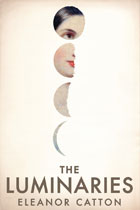
If you are not a fan of the trend of hyper-real, Mantel-esque historical literature, then at first glance you may be tempted to casually discard The Luminaries. Don’t.
The second work from Eleanor Catton (which, at the age of 27, has made her the youngest author ever to be shortlisted for the Man Booker prize) is a mixture of crime drama, supernatural thriller and Treasure Island villainy.
The book begins with Walter Moody, a young Scot of some fortune, arriving in New Zealand to join the gold-digging rush. On his first night he is taken in by a disparate group of 12 men who are investigating a range of crimes in the gold-boom town.
Catton writes in a 19th century vernacular with such ease that you start feeling it would be perfectly natural to don a cravat, knock back some port and engage in some slightly wooden discourse with men with impressive beards. And the fact that at any one point it feels as if Catton is juggling half a dozen different plots, managing to weave them together without disrupting the flow of the book, is even more impressive.
Genuinely difficult to flaw, but certainly difficult to argue that the Canadian-born Catton would not be a worthy (and youngest ever) Man Booker Prize winner.
By David Doyle
Sound like a winner to you? Read the first chapter online here>
The Lowland, by Jhumpa Lahiri3.5 / 5
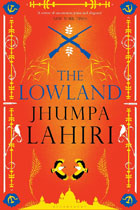
Salman Rushdie’s Midnight’s Children were born at the dawn of a newly independent India. The protagonists of Jhumpa Lahiri’s The Lowland, brothers Udayan and Subhash, are in bed with a dangerous fever when the fireworks go off. The brothers grow into manhood as the new nation goes through its growing pains.
The dutiful and Stoical Subhash is destined to become a devoted family man while Udayan is seduced by the violent idealism of the Maoist Naxalite movement. Both will fall in love with the same woman: the aloof, frustrated Gauri
Without giving too much away, readers in search of belly-laughs should look elsewhere. The Lowland is a fundamentally tragic novel, recalling the Greeks and Thomas Hardy in the bleakness of its emotional landscape and its tight, propulsive plot.
This is a serious, clever book that combines compelling family drama with symbolic depth. Are the brothers really two sides of the same character – the split personality of young India? Is Gauri an incarnation of the Hindu goddesses whose festivities punctuate the action, a divine agent of change and death?
By Patrick Worrall
We Need New Names, by NoViolet Bulawayo
2.5 / 5

This vivid, feisty novel is about the reign of Robert Mugabe and what happened to those who opposed him in Zimbabwe, including the inevitability of exile.
But the dictator is never mentioned and the politics fleetingly referenced – as you would imagine when the protagonist is only 10-years-old.
The novel opens with the escapades of Darling and her tight-knit crew of fellow pre-teens who are left to cope with their world turned upside town. This first half of the novel is the strongest, with the characters and their motivations vividly told in dialogue that jumps off the page. (The portrayal of a DIY abortion for example, is so gut-wrenching that it is almost unbearable to read.)
But when Darling moves to the US, the novel becomes a series of events, where things just happen with no overarching plot or momentum. All the massive themes of homesickness, exile guilt, post-conflict relations and American capitalism are referenced, but never explored, so that the reader becomes less and less engaged in what happens until it finally tails off: putting an end, but not a resolution, to the tale.
By Meabh Ritchie
The Testament of Mary, by Colm Toibin
3 / 5
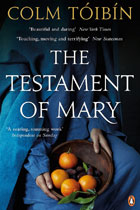
Colm Toibin’s The Testament of Mary tells the story of the adult Jesus Christ through the eyes of his mother.
This unsentimentalised Mary, now in exile after her son’s crucifixion, describes her son’s emergence as a charismatic and controversial figure during a time of political turmoil in Galilee.
Her encounters with several of the evangelists, keen to bear witness to the life of Christ, remind us that, as modern readers, we must inevitably set Mary’s version of events against the authority of the gospels.
The narrative is shot through with frustration, anger and sadness. A brief but powerful meditation on a mother’s grief.
By Mark Greaves